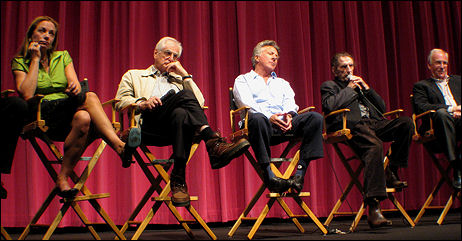Director Ulu Grosbard, who died last weekend at age 83, did three excellent things within a six year period. He directed the original Broadway production of David Mamet‘s American Buffalo, which I was lucky enough to see in ’77. He directed the absolutely dead perfect Straight Time, the Dustin Hoffman crime drama which came out the following year. And he directed True Confessions, the 1983 period drama about an Irish LA detective (Robert Duvall) and his corrupt, wheeler-dealer priest brother (Robert DeNiro).

During the q & a following 6.23.07 screening of Straight Time at L.A. Film Festival — (l. to. r.) Theresa Russell, Ulu Grosbard, Dustin Hoffman, Harry Dean Stanton and producer Tim Zinneman.
Grosbard’s first film-directing landmark was his adaptation of Frank Gilroy‘s The Subject Was Roses (’68). He also directed the slightly less heralded but actually pretty good Falling in Love (’84), a Westchester County remake of Brief Encounter with Robert DeNiro and Meryl Streep.
Grosbard was given a “thanks’ credit on Reservoir Dogs, whatever that alluded to.
But over the last 34 years my instant association has been, “Aaah, the guy who got Straight Time right…yes, eternal admiration and respect.”
I attended a special screening of Straight Time on 6.23.07 at the Billy Wilder theatre during the L.A. Film Festival. Grosbard took the stage after the show along with Hoffman, costars Theresa Russell and Harry Dean Stanton and producer Tim Zinneman. Here‘s an mp3 of a portion of what was said. You’ll hear Grosbard first, and then Stanton and Russell (or the other way around) and then Hoffman comes in with a longish riff about his research, including an interesting observation about how criminals and actors aren’t all that dissimilar.
I’ll never forget a moment during that performance of American Buffalo when Robert Duvall “went up” — i.e., forgot his next line. Costar Kenneth McMillan instantly saw his dilemma and gave him a cue…wham, Duvall was back on it.
Grosbard was born in Belgium in 1929. His family escaped during World War II and landed in Havana, of all places. Grosbard worked as a diamond cutter there. He made his way into the arts through the stage, and he broke into films as an assistant director on Robert Rossen‘s The Hustler (1961), Elia Kazan‘s Splendor in the Grass (1961) and Arthur Penn‘s The Miracle Worker (1962).
Here’s Grosbard’s N.Y. Times obit, written by Bruce Weber.









